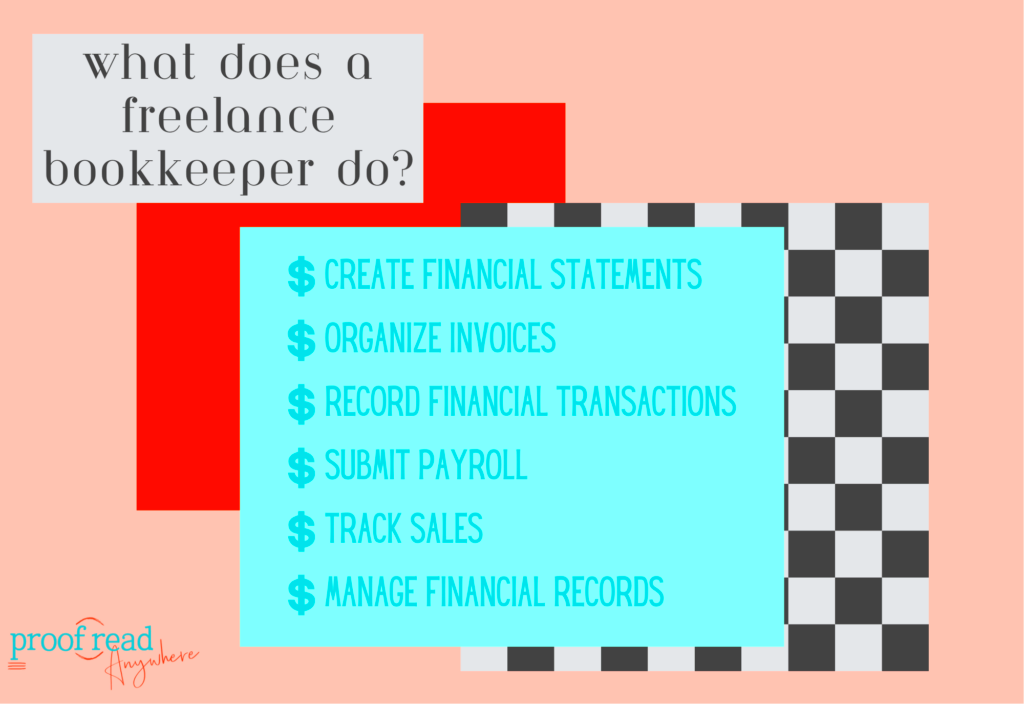Freelance bookkeeping is a flexible and rewarding career choice for those who have an eye for detail and enjoy working with numbers. As a freelance bookkeeper, you help businesses keep track of their financial transactions, ensuring that everything is organized and accurate. With the rise of remote work and businesses increasingly turning to freelancers for specialized tasks, bookkeeping is one field where you can build a successful career on your terms. Whether you're a seasoned accountant or new to the field, freelance bookkeeping can offer you a range of opportunities to grow and develop your skills.
Understanding the Role of a Freelance Bookkeeper

The role of a freelance bookkeeper revolves around managing financial records for clients. Your main responsibilities include:
- Recording daily financial transactions such as purchases, sales, and payments
- Reconciling bank statements to ensure accuracy
- Creating and maintaining financial reports like balance sheets and profit and loss statements
- Managing payroll for businesses
- Preparing for tax filings, although you're not always required to file taxes
As a freelance bookkeeper, you work independently, often remotely, and are usually hired on a contract or project basis. This gives you the freedom to choose clients and projects that align with your expertise. The flexibility to set your schedule is one of the biggest advantages of this career path. However, you must be proactive in finding clients, managing your time effectively, and staying updated with financial regulations and software tools to ensure your services remain relevant.
Also Read This: How to Promote Fiverr Gigs in 2020
Skills Needed to Succeed as a Freelance Bookkeeper

To succeed as a freelance bookkeeper, there are a variety of skills you'll need to master. Some of the most important ones include:
- Attention to Detail: Bookkeeping requires precision. Even small mistakes can have big consequences for a client's financial records.
- Time Management: Managing multiple clients or projects means you need to stay organized and meet deadlines consistently.
- Proficiency in Bookkeeping Software: Knowledge of popular bookkeeping software like QuickBooks, Xero, and FreshBooks is essential for managing finances accurately and efficiently.
- Basic Accounting Knowledge: While you don't need to be an accountant, a basic understanding of accounting principles is important to understand financial statements and reports.
- Communication Skills: As a freelancer, you'll be working with a range of clients. Good communication helps you clarify expectations and deliver the best service.
- Problem Solving: Occasionally, you may encounter discrepancies in financial records. Being able to solve these problems quickly and accurately is crucial.
Developing and refining these skills will help you not only provide high-quality services to your clients but also position yourself as a trusted freelance bookkeeper. The more proficient you become, the higher your chances of attracting steady, well-paying clients.
Also Read This: How to Change My Fiverr Name
Factors That Affect Your Earnings as a Freelance Bookkeeper

Your earnings as a freelance bookkeeper depend on several factors that can vary based on your skills, experience, and how you manage your business. Understanding these factors is crucial to maximizing your income. Let's break down the key aspects:
- Experience: More experienced bookkeepers can typically charge higher rates. If you've been in the industry for several years and have a proven track record, you’ll likely earn more than someone who’s just starting.
- Specialization: If you specialize in certain industries or offer niche services like payroll processing or tax preparation, you can often command higher rates. Businesses value bookkeepers who understand the specific needs of their industry.
- Geographic Location: Even though you can work from anywhere, the demand and rate for bookkeeping services can vary depending on your location. Clients in larger cities or areas with higher living costs may pay more.
- Client Size: The size of the business you work with also plays a role in your earnings. Larger companies with more complex financial needs are likely to pay more for your services.
- Reputation: Your reputation and reviews from previous clients can influence how much you can charge. Building a strong portfolio and having satisfied clients will help you secure higher-paying projects.
- Hourly vs Project Rates: Some bookkeepers charge hourly, while others charge a flat fee per project. The type of rate you choose can influence your total income, depending on how many clients you take on.
By focusing on these factors, you can create strategies to increase your earnings and position yourself as a go-to freelance bookkeeper in your niche.
Also Read This: When Will Fiverr Pay Me? Understanding the Payment Process
How to Find Freelance Bookkeeping Jobs

- Freelance Websites: Platforms like Fiverr, Upwork, and Freelancer are great places to start. These websites connect freelancers with clients in need of bookkeeping services. You can browse job listings, submit proposals, and even set up a profile that highlights your skills.
- Networking: Building a strong network is one of the most effective ways to find freelance clients. Attend local business events, webinars, or conferences related to accounting and finance. You can also use LinkedIn to connect with potential clients.
- Referrals: Word of mouth is powerful in the freelance world. Ask your current clients to refer you to others. You can offer a small incentive or discount to clients who send new business your way.
- Job Boards: Websites like Indeed and Glassdoor may list freelance bookkeeping positions. These can be full-time remote jobs or contract work that fits your schedule.
- Social Media: Don’t overlook social media platforms. Join groups or pages related to bookkeeping and accounting, and participate in conversations. You can also advertise your services on Facebook, Instagram, or Twitter.
Persistence is key. The more places you look and the more proactive you are, the higher your chances of landing steady clients.
Also Read This: Do Love Spells on Fiverr Work? Exploring the Truth Behind Online Rituals
Setting Your Rates as a Freelance Bookkeeper
Setting your rates as a freelance bookkeeper can be tricky, especially if you're new to freelancing. The goal is to find a balance between charging what you're worth and staying competitive in the market. Here’s how you can figure out the right rates:
First, research the average rates for freelance bookkeepers in your area or industry. You can use websites like Glassdoor, PayScale, or even ask in online forums to see what other professionals are charging. Here's a rough guide:
| Experience Level | Hourly Rate (Approx.) | Project Rate (Approx.) |
|---|---|---|
| Entry-Level (0-2 years) | $20 - $30 | $150 - $500 |
| Mid-Level (3-5 years) | $30 - $50 | $500 - $1,500 |
| Experienced (5+ years) | $50 - $80+ | $1,500+ |
Keep in mind that your rate should reflect not only your experience but also your niche and the complexity of the work you do. For example, if you're providing bookkeeping services for a larger business with more transactions, you can charge a higher rate than if you're working with a small, local business.
Also, remember to consider the time it takes to complete each task. Some tasks might seem simple but could take longer than expected. Be sure to factor in administrative work, communication with clients, and any potential revisions when calculating your rates.
Lastly, don't be afraid to raise your rates over time as you gain more experience and build your portfolio. As you prove your value to clients, your rates should reflect that growth.
Also Read This: What is Fiverr’s Choice?
Challenges You Might Face as a Freelance Bookkeeper
While freelance bookkeeping offers great flexibility and earning potential, it's not without its challenges. Understanding these challenges will help you navigate them successfully. Here are some common obstacles freelance bookkeepers face:
- Finding Clients: In the beginning, it can be difficult to secure clients. As a freelancer, you're responsible for marketing your services, and that can be time-consuming. Without a steady stream of clients, your income might fluctuate.
- Managing Your Time: As a freelancer, you’re in charge of your schedule. While this offers freedom, it can also lead to time management issues. Balancing multiple clients, meeting deadlines, and handling administrative tasks can sometimes feel overwhelming.
- Inconsistent Cash Flow: Unlike a salaried position, freelance bookkeepers may face inconsistent income. Payments from clients can vary based on project size and payment terms, leading to financial uncertainty at times.
- Keeping Up with Tax Laws and Regulations: Bookkeeping involves staying updated on changing tax laws and financial regulations. If you work with multiple clients, each may have different needs, making it important to stay knowledgeable on various regulations.
- Dealing with Difficult Clients: Not every client will be easy to work with. Some might be slow to pay, while others could be unclear about their expectations. Managing client relationships effectively is key to maintaining a successful freelance business.
Despite these challenges, many bookkeepers find ways to overcome them with proper planning, good communication, and a commitment to continuous learning. Recognizing these challenges early on will prepare you to handle them as you grow in your freelance career.
Also Read This: What Does Live Portfolio Mean on Fiverr?
Frequently Asked Questions
Here are some commonly asked questions about freelance bookkeeping:
- What skills do I need to become a freelance bookkeeper?
You need a strong understanding of bookkeeping principles, proficiency with accounting software, and good attention to detail. Communication and time management skills are also important for managing clients. - How much can I earn as a freelance bookkeeper?
Your earnings depend on factors like experience, specialization, client size, and location. Freelance bookkeepers can earn anywhere from $20 to $80+ per hour, depending on their experience and the complexity of the work. - Do I need a certification to be a freelance bookkeeper?
While certification isn’t mandatory, it can increase your credibility and marketability. Options like the QuickBooks Certified ProAdvisor or becoming a Certified Bookkeeper through the American Institute of Professional Bookkeepers (AIPB) can help boost your reputation. - How do I set my rates as a freelance bookkeeper?
Your rates should reflect your experience, the type of service you provide, and the market rate. Research industry standards and adjust your pricing accordingly, but be flexible to negotiate with clients as needed. - Can I work with multiple clients at once?
Yes, freelance bookkeepers often work with multiple clients at the same time. However, effective time management and organization are crucial to ensuring you meet all deadlines and deliver quality work for each client.
Conclusion
Freelance bookkeeping offers great opportunities for those who enjoy working with numbers and have the right skills to manage financial records. While there are challenges, such as finding clients and managing inconsistent cash flow, they can be overcome with persistence and good business practices. As a freelance bookkeeper, you have the flexibility to choose your clients and set your rates, but it's essential to stay updated with industry knowledge and manage your time effectively. With the right approach, freelance bookkeeping can become a rewarding and profitable career choice.




